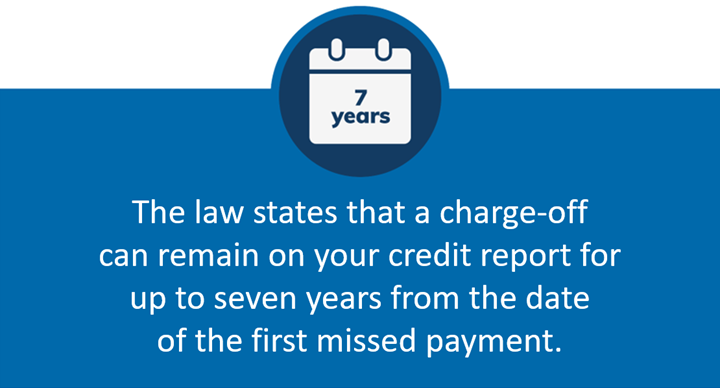You may be wondering what does a charge-off mean? You may also be wondering if you are still obligated to pay a charged-off debt. Keep reading to learn more about charge-offs.
- What Is a Charge-Off?
- What Is the Difference Between a Charge-Off and Collections?
- Is a Charge-Off Reported to Credit Reporting Agencies?
- Should You Pay Charged-Off Accounts?
- Wrapping Up: What Does a Charge-Off Mean?
What Is a Charge-Off?
A charge-off is a type of declaration when a creditor believes a debt that is owed will not be repaid. Typically, a charge-off occurs when a consumer has not made payments for a long period of time. Charge-offs can also occur if the minimum payment has not been made for several months and the account is delinquent.

When a charge-off appears on your credit report, it is known as a derogatory. Having a derogatory can have a negative impact on your credit. That being said, creditors typically don’t declare a charge-off until you have missed your minimum payment for at least six months. Creditors are generally willing to work with you to set up a payment plan, so make sure you look into all your options if you’re in debt.
What Is the Difference Between a Charge-Off and Collections?
There are a lot of terminologies when it comes to understanding finances and debt and deciphering all that language can be confusing. While a charge-off and collections are similar in some ways, there are key differences.

Companies are generally required to charge-off accounts that they believe will not be repaid by the borrower. Even after an account is charged-off, the unpaid balance remains due. Companies typically will charge-off an account after six months of nonpayment. They may also charge-off accounts where the minimum payment on a debt has not been met for an extended period of time. This charge-off is often reported to one or more of the credit reporting agencies and may appear on a credit report.
At any time during this process, your creditor may choose to pursue the balance due and place your account for collections. The original creditor may also choose to sell your account to a debt collections company. In some instances, these third parties may report the delinquent or charged-off account as a collections account. This means that continued efforts are being made to recover the past due balance.
Is a Charge-Off Reported to Credit Reporting Agencies?
When an account is deemed to be uncollectible and charged-off, the creditor will often report this as a charge-off to at least one of the credit reporting agencies. Depending on the creditor, the creditor may choose to report the charge-off account to multiple credit reporting agencies. Because charge-offs may be reported to credit reporting agencies, many individuals seek to avoid them. If you have a debt you haven’t repaid or you spot a charge-off on your credit report, you can create a budget and start paying off that debt.
It’s not always easy to keep your finances in order and avoid negative items such as charge-offs and collections accounts. If you do have an account in collections, you can get help to take control of your debt.
Should You Pay Charged-Off Accounts?
If you recently became aware of a charge-off account, you might be wondering what you should do. There are multiple ways to resolve a charge-off or collection account. If the account is valid, and all the information being reported is correct, you can engage with the current creditor or collections agency and arrange for repayment.
If the account is not valid, or some of the information about the account is invalid, you can dispute the incorrect information. More than likely the incorrect information will be corrected or removed.
Wrapping Up: What Does a Charge-Off Mean?
As a consumer, you probably have many questions about charge-offs. What does charged-off mean on a credit report? How do I resolve charge-offs? What effect do they have?
If you have an unresolved debt, talk to your creditor or collection agency about resolving your debt and getting back on track. The sooner you resolve your debt, the faster you can put it behind you. At Midland Credit Management, our team can work with you to resolve your debts and create a repayment plan that works for you.